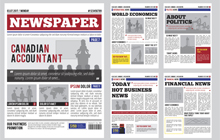Friday News Roundup 21.02.05: ESG nonsense, CERB class action, Big Six synthetics and more

Wrapping up the odds and ends in this week’s Canadian accounting news
TORONTO, Feb. 5, 2021 – While the week’s news was dominated by the growing sense that the Canadian government has been a failure at procuring vaccine shipments, it was easy to miss some of the odds and ends from the world of Canadian accounting (broadly speaking) that still made the news:
The Rosens on carbon-adjusted earnings
Al and Mark Rosen had a contentious Op-ed in Advisor’s Edge this week, questioning the murky disclosure rules around environmental, social and governance (ESG) reporting. The Rosens argue that carbon-adjusted earnings in particular—using French multinational dairy operator Danone S.A. as an example—are an opportunity for “unfortunate overreach.”
They are not completely dismissive: “Separate ESG ratings for companies, while not without their own problems, are useful enough when screening portfolios for an environmental mandate.”
Lanthier: Canada needs corporate global minimum tax
Allan Lanthier continues to write some thought-provoking Op-eds — mostly in the Financial Post but sometimes in Canadaian Accountant — on Canadian tax policy. In “Canada needs a corporate global minimum tax,” Lanthier breaks down multinational tax avoidance strategies, and calls for a similar minimum tax rate as the “global intangible low-taxed income” (GILTI) introduced in the United States by the Trump Administration.
Curb the CERB clawback says proposed class action
The ongoing fight between self-employed Canadians and the federal government over CERB payments and gross versus net income is ratcheting up. The Toronto Star reported this week that “A semi-retired Mississauga teacher is the representative plaintiff for a proposed class-action lawsuit against the federal government, on behalf of self-employed pensioners affected by the confusion over eligibility for the Canada Emergency Response Benefit.”
Big Six dividend deductions synthetic?
The Financial Post reported that the Canada Revenue Agency is in a dogfight with the Big Six and Canadian Bankers Association over the use of a complicated strategy involving “synthetic equity arrangements.” Banks and pension funds say it’s risk mitigation. The CRA says it’s (aggressive) tax avoidance. The fight is based on a 2015 change in legislation and the stakes are piled high at six billion dollars and counting.
Data privacy and online tax filing
How safe is the personal data of Canadians when they file their taxes every year? As a McGill researcher points out in the Globe and Mail: “There are currently 39 different products for online tax filing, putting the burden of figuring out which ones take our privacy seriously on citizens.” The reliance on private companies makes a mockery of the Canada Revenue Agency’s Taxpayer Bill of Rights, says Michael Gervais.
No bankruptcies. That’s good, right?
The COVID-19 pandemic has kept many Canadian businesses and families from going bankrupt, according to the Canadian Press. According to data from the Office of the Superintendent of Bankruptcy, total insolvencies in 2020 reached the lowest level since tracking began in 1987. Great for Canadians, bad for businesses dealing in bankruptcy and debt.
“These historic low insolvency filings reflect the government aid programs that have kept many individuals and businesses afloat despite the significant financial distress caused by the pandemic,” said CAIRP Chair Mark Rosen. “What we can’t see in the insolvency data yet is how things will change as the taps are turned off.” Indeed, the CBC reported bankruptcies jumped late last year, and the latest MNP Consumer Debt Index reported many Canadians are downright depressed about debt.
By Canadian Accountant staff.







(0) Comments